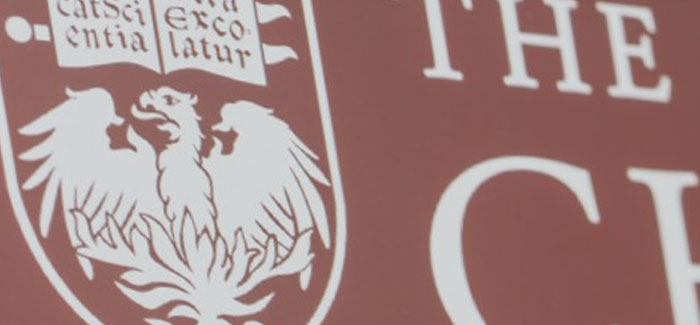
Collaborative approaches to complex questions
The Neubauer Collegium shares research with the public while making the University a destination for collaborating academic leaders.
In March the Neubauer Collegium, an initiative of the Social Sciences and Humanities Divisions that funds and supports collaborative research into complex questions, selected its inaugural cohort of 18 faculty projects. Involving scholars from across University disciplines and from around the world, many of the projects engage questions central to the social sciences. Projects include the Working Group on Comparative Economics and Engineered Worlds: Living Post-Nature (see the full list, with complete descriptions at neubauercollegium.uchicago.edu).
But what happens now that the projects have been chosen? "Next comes the actual day-to-day feeding, caring, and grooming of collaboration, which is not trivial," says David Nirenberg, the Deborah R. and Edgar D. Jannotta Professor of Medieval History and Social Thought, who was announced as the founding director of the Collegium in summer 2012. The value of collaboration in an academic setting seems obvious, but roadblocks to interdisciplinary work lie from conception to practical applications. "Most of us don't think, 'I want to collaborate.' That's not how we begin," says Nirenberg. "We begin with a question that interests us."
The Neubauer Collegium will support the work of Chicago faculty by providing financial and administrative support for working-group meetings, conferences, research assistance, performances, and other forms of collaboration, as well as visits by distinguished scholars. For instance, the State as History and Theory project, led by Elisabeth Clemens, AM'85, PhD'90 (Sociology); Bernard Harcourt (Political Science, Law); and James Sparrow (History), will examine nonstate forms of organized power and governance that have emerged in response to privatization and globalization, leading toward a new political theory of democracy. The project will bring collaborators from across the United States for workshops, and it also will host Stephen Sawyer, AM'97, PhD'08 (History), founder of the urban-studies program at the American University of Paris, as a Collegium Visiting Fellow.
We want to encourage work that interconnects questions, people, and ideas, both within the University and outside in the world.
At times, Collegium advisory-board members serve as matchmakers. "We might have a group of people working on health care and social policy in the Asian subcontinent, and we realize that there are people in multiple departments working on that," Nirenberg says. "We can see that from our bird's-eye view." He notes a request the Collegium received to curate a conversation on digital tools and the humanities, raising questions such as: How do these tools change the kinds of questions we ask? And how do they affect the work we do? "People are coming to the Collegium for us to do this match-making, culture-catalyzing function." Of course, there is more to encouraging collaboration than making like-minded researchers aware of each other. The Collegium staff supports research teams in practical matters, such as creating online environments where UChicago faculty can collaborate with colleagues from other institutions. A Collegium website will give each project its own space, so parties around the world can follow its developments. When the Collegium moves into its new home at 5701 South Woodlawn Avenue, the former Meadville-Lombard Seminary Building, in autumn 2014, it will create new opportunities. In addition to offices for visiting fellows, the renovated building will include spaces for collaborative research and public engagement--not only lecture halls and conference rooms but also exhibition space to present art and performances. The two-year Engineered Worlds project, under the direction of associate professor of anthropology Joseph Masco, includes an art exhibit that, Nirenberg notes, is "not just show and tell. It's an attempt to represent the nature of the question, the nature of the problem in a new way." "We don't want to be just another funding agency," says Nirenberg. "We want to encourage work that interconnects questions, people, and ideas, both within the University and outside in the world." Work thus far on the Collegium, which will hold a formal inauguration in October, "has been much easier than I expected," says Nirenberg. "It seems as if there are no artificial barriers to doing things." The only surprise, he says, has been seeing "just how many collaborative projects of really high quality emerged from the faculty the minute we created the opportunity for that to happen. We received 50 really strong applications." The Collegium's spirit of collaboration has even influenced Nirenberg, who studies the interactions between Jewish, Christian, and Islamic cultures. "I find myself collaborating now with mathematicians, Arabists, painters--people that have very different practices from my own," he says. The Collegium encourages scholars to formulate collaborative questions in a way, he says, that "has certainly opened me to that practice."